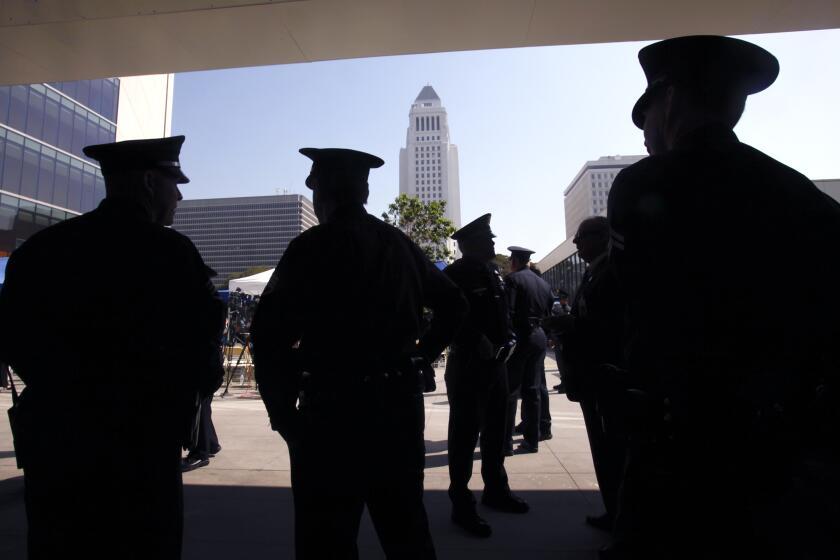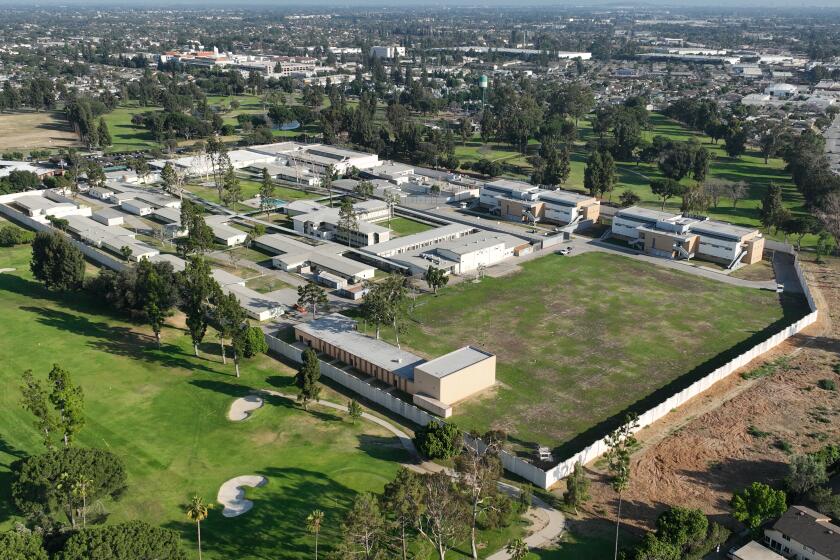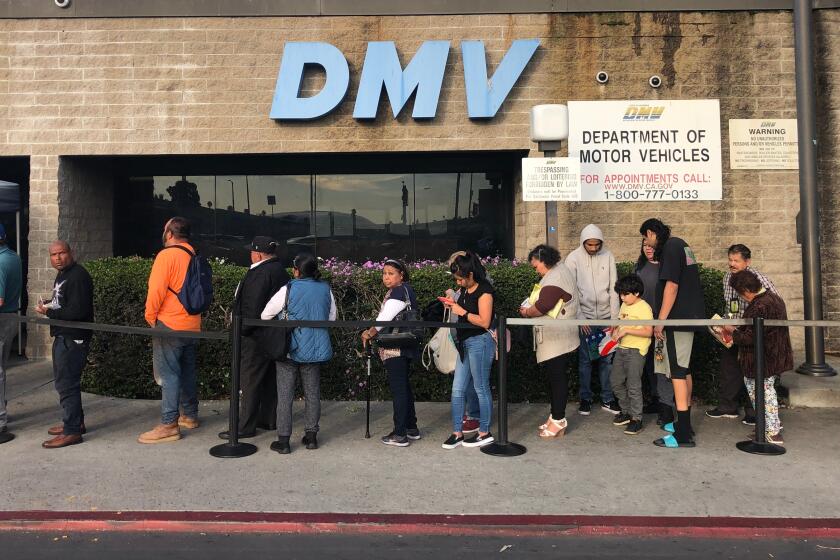A rich L.A. neighborhood donated surveillance technology to the LAPD — then drama ensued

- Share via
When residents of a ritzy West L.A. neighborhood experienced an increase in burglaries last year, they decided to invest in technology to fight the problem.
The neighborhood association in Cheviot Hills — a community of million-dollar homes sandwiched between the 10 Freeway and Century City — raised more than $200,000 to purchase scores of controversial, high-tech cameras that scan license plates.
The automated plate readers, as they are known, enable authorities to track when vehicles of interest pass through certain intersections. The devices can also be mounted on police cars, allowing officers to sweep up troves of license plate data as they drive around. Police say the gadgets help investigate stolen cars, locate fugitives, and solve crimes by checking who came and went from a neighborhood on any given day.
But when the community donated the cameras to the Los Angeles Police Foundation — one of several nonprofits that support the Los Angeles Police Department — they sent them with strings attached: The police were only allowed to use them in Cheviot Hills.
In the months since, the act of charity has ignited discussions about who gets to decide how technology donated to the LAPD is deployed — and whether the data collected by the plate readers could be used for purposes far beyond the intended scope.
Critics have long warned about privacy concerns because the cameras track people without consent or a warrant, collecting data about law-abiding motorists that is stored up to five years.

Since its creation more than 25 years ago, the Los Angeles Police Foundation has funneled millions from mostly unnamed donors to the LAPD. Sometimes the money pays for holiday parties or exercise equipment, but it has also been used to acquire cutting-edge police equipment and technology not covered in the department’s annual multibillion-dollar budget.
LAPD Deputy Chief John McMahon has accused the Police Foundation of overstepping its bounds with the plate reader donation, according to sources who requested anonymity to avoid retaliation for speaking about internal department matters. McMahon objected to the limitations on where the cameras could be used, the sources said, and also took issue with the foundation pushing to buy the plate readers from a specific contractor, an Atlanta-based startup called Flock Safety.
A Times analysis of police shootings over the past decade found that officers are rarely — if ever — punished for firing bullets that hit or endanger fellow cops and bystanders.
After McMahon questioned the Flock camera donation in December, foundation board member Jeffrey Neu filed an internal complaint against him alleging bias, the sources said.
Neu did not respond to a request for comment.
McMahon declined to discuss the pending complaint, but told The Times there were good reasons to push back against the donation. The Flock cameras, he said, are not totally compatible with the LAPD’s systems, including the department’s fledgling real-time crime center, which monitors intelligence gathered from around the city.
The department already uses plate readers from major companies Motorola Solutions and Axon, and McMahon said there are strict rules about how long the data they collect is stored, who gets to see it, and when. Its contract with Flock’s data policies are slightly different, he said.
McMahon, who heads the LAPD’s Information Technology Bureau, said police departments should own and “retain full control” of the data they collect and be able to use it “as law enforcement agencies see fit” under the law.
“Right now individual companies are trying to monopolize the business and prevent that from happening,” said McMahon. “That’s not in the best interest of taxpayers.”
The Police Foundation did not respond to inquiries.
Holly Beilin, a spokesperson for Flock Safety, said the company recently gave law enforcement users, including the LAPD, the ability to more easily integrate Flock’s software with their systems. The department has used Flock cameras before without issue, Beilin said, noting that police can also access privately owned devices with permission from the owner.
For the record:
9:30 a.m. April 10, 2025An earlier version of this story said Flock made source code available for free to law enforcement users. It did not.
“There are more Flock cameras in the Los Angeles metro area than almost any other vendor, and detectives are regularly using them to solve crime,” she said.
She added that under the company’s terms of service, Flock customers who give their cameras to police have to abide by Senate Bill 34 and other laws governing the sharing of license plate data.
The Flock dispute has made enough noise to draw more scrutiny from the department’s civilian oversight panel, which said it wants to avoid a precedent where crime-fighting technology only goes to areas that can afford it.
At a meeting earlier this year, members of the Police Commission voted to approve the Cheviot Hills donation. The City Council also signed off on accepting the Flock cameras.
But oversight officials have demanded more information about the department’s overall strategy for deploying plate readers in other areas of the city.
LAPD officials told the commission they currently have 1,500 police vehicles equipped with plate readers and another 160 devices that are mounted onto poles. The cameras, essentially a beefed-up version of the technology used to collect highway tolls, collect hundreds of thousands of plate numbers every month.
Images of the plates are automatically run through criminal databases and trigger alerts to officers in the field when they record a “hit.” Some vendors claim that new add-ons can detect subtle changes in motorist behavior, such as when a would-be burglar is “casing” a home by circling the block in their car.
The department currently has an information-sharing agreement with five other jurisdictions, who have all agreed that they will not share the data with federal immigration authorities.
A reader laments that privacy laws may prevent the public from knowing the outcome of a report on allegations of racist, sexist remarks by LAPD officers.
Commission President Erroll Southers asked how LAPD chooses where the readers are stationed, and whether the decisions are “being influenced by donors.”
Most of the cameras are stationed in the San Fernando Valley, near crime hot spots and critical infrastructure, as well as at highway exits and on-ramps, responded Cmdr. Gisselle Espinoza.
“It is not random, it is not loosey-goosey, it is not something capricious,” she said. “It is very thoughtful.”
A point of contention with the Cheviot Hills cameras is that the neighborhood’s donation to the foundation bypasses the city’s regular procurement policy, which requires a bid process and vetting of vendors.
In a statement, the Cheviot Hills Homeowners Assn. said it preferred Flock “due to their stellar reputation and strong recommendation from the experts we consulted with.”
Cindy Kane, who sits on the neighborhood association’s board, said residents conferred with police, their local City Council office and other neighborhood associations before making their pick. One factor, Kane said, was that Beverlywood and other nearby communities had already signed deals with Flock.
“The board discussed the privacy issues versus being proactive to address the crime, and that far outweighed the concerns of privacy issues,” she said. “We also determined that working with the Police Foundation was the most effective and efficient way to secure donations from our residents that could be earmarked for this purpose.”
LAPD data shows burglaries in Cheviot Hills doubled from 22 in 2023 to 45 in 2023, but other types of crime in the neighborhood are low compared to the rest of the city.
City and police leaders announced double-digit declines in homicides compared with 2023, including a halving of gang-related slayings, but the recent election results show public safety remains a concern.
The public perception that crime is spiraling out of control — even as statistics show many cities are the safest they have been in decades — is one factor for why license plate readers have proliferated across the country.
Civil liberties groups, activists and some academics have called on more states to tighten regulations on the technology, citing concerns about over-policing in communities of color, among other issues.
False positives — where police wrongly identify a suspect based on a vehicle — are a risk, especially since records in the stolen car database are sometimes out of date. There is also worry about the security of the captured data, and who has access to it.
The LAPD’s lack of a formal data-sharing agreement with Flock opens the door for federal authorities to potentially request information from the company about an immigrant’s whereabouts — undercutting the city’s promise not to cooperate in the Trump administration’s mass deportation campaign, warned Tiff Guerra, an organizer with the activist group Stop LAPD Spying.
LAPD Chief Jim McDonnell has removed the head of the department’s constitutional policing office, a lawyer who had drawn the wrath of the police union for her role in releasing thousands of mugshot-style photos of officers.
The group’s members and other critics routinely attend commission meetings and decry the department’s growing arsenal of predictive policing software, facial recognition and other technologies.
Putting plate readers in Cheviot Hills seems designed to further alienate wealthy communities from Blacks and Latinos, according to Guerra.
“It raises questions, like, who gets surveilled? Who has the ability to pay for that surveillance and who’s able to pay for these digital surveillance rings around their communities?” Guerra said.
But whether the plate readers are placed in South L.A. or wealthier areas, police officials say concerns about mass tracking of motorists are overblown.
LAPD Det. Alan Hamilton, who runs the LAPD’s detective bureau, said the department already has its hands full trying to solve crimes — there’s simply not enough time or manpower to start acting like Big Brother.
“My detectives are too busy just trying to keep up with the Joneses,” Hamilton said.













